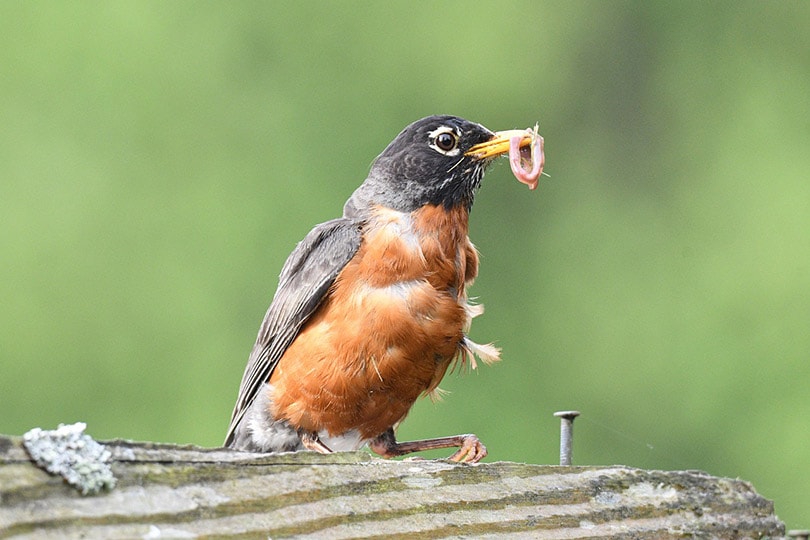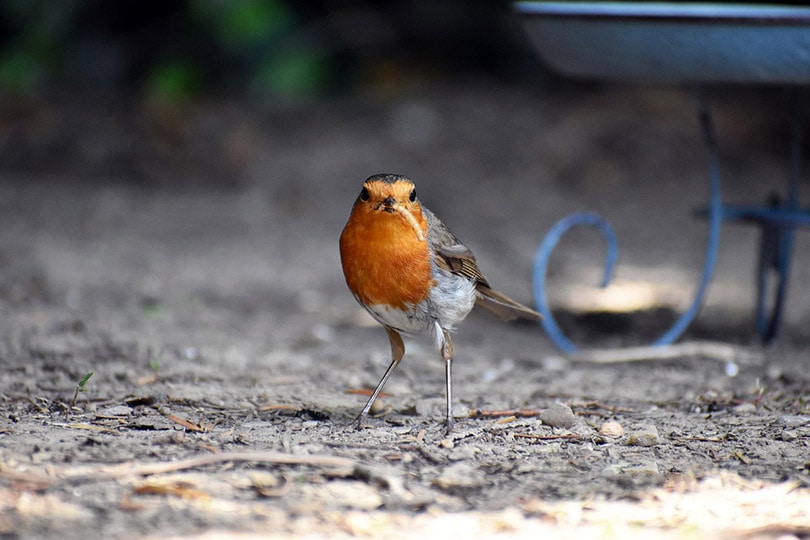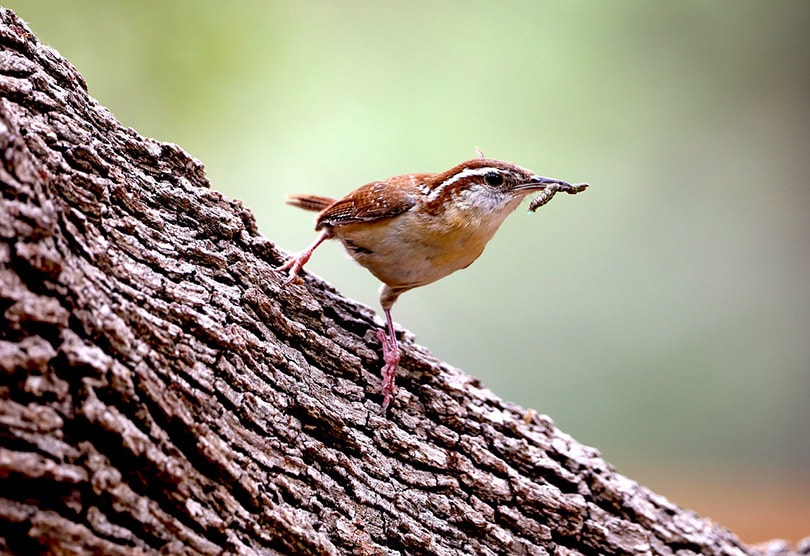How do Robins & Other Birds Find Worms?
Last Updated on

The American Robin is a well-known bird that you can notice throughout America during spring and summer. You will likely catch them bobbing around your lawn before they pull a worm from the soil. While they feed on other insects and seeds, worms are an essential part of a Robins’ diet.
It might seem weird how Robins and other birds always know where the worm is hidden and how they catch them effortlessly. We wanted to explain this topic more, so keep reading to learn more about how robins and other birds find worms.

Why Do Birds Eat Worms?
Worms are a true delicacy in the birds’ world, so many bird species love to eat them. Worms are full of protein and other nutrients essential for a bird to develop its muscles. As worms are abundant and easily accessible, they make perfect food for birds.
Most backyards and gardens have tons of earthworms under their soil, so birds will likely come there to eat. Also, worms are easy to catch, and birds love when they have easy prey that they can quickly capture.
These birds also feed their young ones with worms because that will help them be healthy and develop properly.

Can You Feed Worms to Your Pet Bird?
If you have a pet bird, you could purchase worms from a pet store instead of making it hunt for them. Pet birds are usually used to the home environment you raise them in, so they’re not the best hunters. Also, your pet bird could accidentally eat a toxic worm or a worm that was exposed to pesticides, which could harm your bird’s health.
Still, if your pet bird has a proper diet, there’s no need to feed it with worms unless it’s something that your bird enjoys eating.
Which Birds Eat Worms?
Plenty of bird species that are omnivores and eat insects will also eat worms.
- American Robin
- Clapper Rail
- Thrush
- Sora
- Common Blackbird
- Black-bellied Plover
- Killdeer
- Eastern Screech-Owl
- Blue tit
- Wren
- Short-billed Dowitcher
- Eurasian Blackbird
- American Woodcock
- Black-tailed Godwit
- Marbled Godwit
Some of these birds consume worms on a daily basis, while others hunt for them occasionally due to the lack of other food sources.

Which Birds Don’t Eat Worms?
Unfortunately, you were wrong if you thought that all birds like eating worms, as not all birds like to feed on them. In fact, more bird species dislike eating worms than those that enjoy eating them. For example, birds such as Doves, Pigeons, Hawks, Hummingbirds, and Eagles don’t eat worms.
Instead, these species feed on fruits and seeds while some species like Hawks eat small mammals.
Do Birds Eat Dead Worms?
Birds don’t like dead animals, so you won’t see a bird eating a dead worm. When worms are dead, they attract bacteria and start to decompose, which creates a foul smell and an awful taste. Dead worms also do not have all the nutritional benefits they contain when alive, and they can become toxic. That’s why Robins and other birds only tend to eat live worms.

Robins and Their Diet
American Robins are interesting birds you can find throughout North America. They are frequently visiting our backyards and gardens in search of food. American Robins are especially fond of worms, as they cover over 20% of their diet. They also feed on caterpillars, spiders, termites, crickets, and various insects, as they are all a great source of protein.
They tend to feed on worms during spring, while they look for fruits and berries during winter. These birds will sometimes fight to get the worm that another bird has caught.
So, How Do Exactly Robins and Other Birds Locate Worms?
Like humans, birds have developed senses. A bird’s sense of vision, hearing, taste, and touch is essential for the bird to locate worms under the ground. Different bird species rely on some sensors more than others, but discovering the worms is a similar tactic in most birds. Below you can find more details about how Robins and other birds use their sensors to locate worms.

Vision
Robins and other birds mainly depend on their eyesight to locate worms. That’s why the sense of vision is crucial while the bird is hunting for its next meal. Robins rely on their eyesight to find delicious worms in the ground. Since birds have keen eyes and excellent vision, they can quickly spot a worm poking out of the ground. They can also notice movements under the ground and changes in soil, which can indicate there’s a worm. Once they see the worm, the birds will quickly strike.
Hearing
Their sense of hearing is also crucial since birds can hear worms moving through the soil. Although that’s not a sound that humans notice, birds will quickly realize when a worm moves under the ground. Still, birds cannot catch worms using hearing alone, so they need to combine their senses to make the catch. Also, when it comes to Robins particularly, they do not pay much attention to these sounds.
Touch
Birds can feel movement under their feet, alerting them if there’s an insect or a worm nearby. Robins and other birds can also use their sense of touch to detect movements under the ground and locate worms. Also, this sense is not enough to catch a worm, so a bird needs to combine it with the other senses we mentioned to be successful at hunting worms.
Taste
Birds are very sensitive creatures, and their sense of taste is impeccable. They can notice worms simply by tasting the soil when they peck the ground. Robins and other birds poak through the soil until they see soil rich in worms. Once they locate them, they will put their beak into the soil to catch their prey.

How Do Robins Catch Worms?
Robins commonly make short hops and runs while hunting, while they also have a period where they stand still and observe their target. When a robin detects a worm, it approaches it slowly, cocks its head, and thrusts its beak in the soil to catch the worm.
They are amazing hunters, and they can catch over 20 worms per hour due to their skills.
How to Help Robins and Other Birds to Find Worms
- Regularly mow your lawn and keep it short so that the birds can easily reach worms
- Water your garden and lawn early in the morning to attract worms closer to the surface
- Avoid using pesticides and toxic products to kill insects in your yard
- Leave fallen leaves when you find them since they are a great hiding place for worms
- Purchase worms and place them in feeders if there are no worms in your garden

How to Attract Robins and Other Birds to Your Backyard?
There are plenty of different ways you can attract Robins and other birds to your backyard. The first thing you should do is find a designated spot in your backyard where you will set up feeders, birdhouses, and even a birdbath. Also, provide a source of clean water where the birds can drink and bathe if needed.
Another helpful thing would be to plant trees, bushes, and plants that attract birds and provide shelter. You could add colorful flowers or paint the birdhouses in colors that attract birds. Birds love landscapes, so if your landscape is adequately set up, it will attract more birds,
You should ensure that there are no predators in your backyard so that the birds can enjoy hunting for insects and nesting without being in danger. Having Robins and other birds in your backyard can be a great way to get rid of overpopulated insects, while the birds will have an excellent food source near them.

Final Thoughts
As you can see, finding worms is a complex process that requires Robins and other birds to use a combination of their senses to catch the worm. Although this is a tough job, birds consider it rewarding since worms are a fantastic source of nutrients and vitamins. Birds are skillful hunters, so worm hunting is a fun activity that many birds love.
Featured Image Credit: Veronika_Andrew, Pixabay
About the Author Robert Sparks
Robert’s obsession with all things optical started early in life, when his optician father would bring home prototypes for Robert to play with. Nowadays, Robert is dedicated to helping others find the right optics for their needs. His hobbies include astronomy, astrophysics, and model building. Originally from Newark, NJ, he resides in Santa Fe, New Mexico, where the nighttime skies are filled with glittering stars.
Related Articles:
10 Types of Hummingbirds in Arkansas (With Pictures)
8 Types of Hummingbirds in Nebraska (With Pictures)
5 Types of Hummingbirds in Idaho (With Pictures)
3 Types of Hummingbirds in Mississippi (With Pictures)
8 Types of Hummingbirds in Kansas (With Pictures)
5 Types of Hummingbirds in West Virginia (With Pictures)
5 Types of Hummingbirds in Ohio (With Pictures)
Where Do Nuthatches Nest? Nuthatch Nesting Habits Explained
